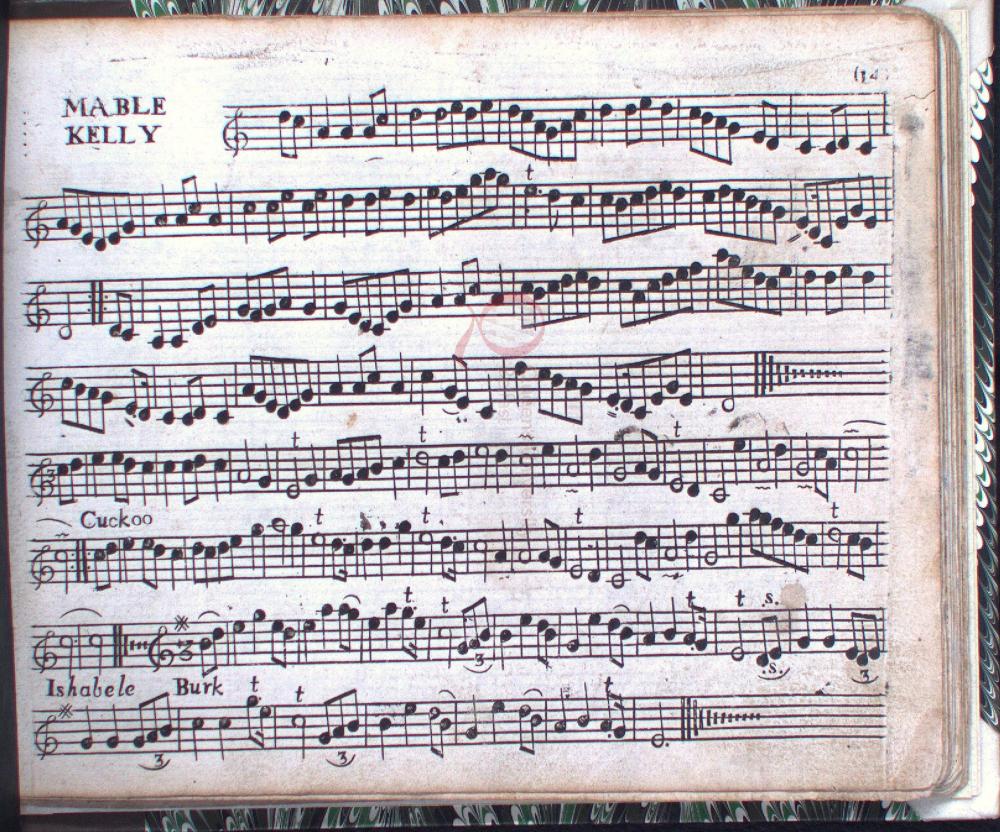Mable Kelly
| TYPE | 3 - Complex Melody |
| TOPIC | Praise |
| TUNE STRUCTURE | A16 B16 |
| VERSE STRUCTURE | 5v 8l |
| TIME SIGNATURE | 34 |
| TONAL CENTRE | D |
| INCIPIT | GGGB♭CCD'CD'CB♭GF |
| GENRE | Amhrán Mór |
| TEXT SOURCE | Royal Irish Academy MS 23 A 1: 64 |
| TUNE SOURCE | A Collection of the Most Celebrated Irish Tunes (Dublin: John and William Neal, 1724), p.14 |
| FIRST LINE | Is cia bidh a mbeith sé 'n dán dó |
| NOTATED INCIPIT | |
| The harper Hugh Higgins attributed this tune to Carolan (recorded in Bunting’s manuscripts) and Carolan is also the author of the song text. Carolan’s biographer, Donal O’Sullivan, suggests that Mable Kelly was the daughter of Laughlin Kelly of Lismoyle, Co Roscommon. For these details and other notes on the Neals’ Celebrated Irish Tunes, see Nicholas Carolan’s modern edition (1986; 2010 revised ed.). | |
Máible Shéimh Nidh Ceallaigh Is cia bidh a mbeith sé ‘ndán dóA láimh dheas ‘fáil faoina ceann,Is deimhin liom nárbh eagal bás dóCaoidhche go bráth, ná ionna bheo ‘bheith tinn.A chúl deas na mbachall fáineach fion,Cum mar an alla is gille snámh air a’ tuinn;Grádh agas spéis gach gastraidh Máible shéimh Nidh Cheallaigh,Déad is deise leagadh ‘n áras a chin.Níl ceol dá bhinne fós dár rinneadhNach dual uaithe ‘thuigse is a rádh an gach dán;Tá gruaidhe mar rós a’ drille, is buan ‘na comhursa an lille,A rosc is míne glaise ná bláth na gcraobh.Is gurb é deir ollamh moltaidh Chlár Shíol NéilGo gcuirfeadh na corra ‘chodladh le sáir-guth a béil;Níl amhras liom an, a shúil bhrádh lonnach,Acht óltar lin go grinnioll do shláinte mhaith shéimh.Ó d’éagadar na mná mánlaAir a dtráchdaidís andomhan go léir,Measaim nach bhfuil ‘na áit aguinAcht Máible ‘seasadh a gcliú ions gach céim.Ansacht gach duinne, a gcáiligheacht is a gcéil,Is áthamhuil don fhille a faghail ón déis;Cúl na gcraobh is finne, lúb na dtéad is binne,Snuadh na géise gille a bráigh ‘s a taobh.Níl aon dá bhfeiceann an tsaoi-bhean mhaiseach,Nach n-éirighionn mar na gceilte ‘mbarra na gcraobh;Is an té nach léor dó ‘n choinneall lán do spéis an leinbh,A dtréithre, a dtuigse do násún Gaodhal.‘S í is deise bos, cos, lámh is béul,‘S a péire rosc is a folt ‘fás léith’ go féarr.Tá ‘n báire so linn ó Árainn go Glinn;‘Nios ó fuair mé an faill, nach aghmhúghail dham é?Nach mór an dí náire don sdáid-mhnaoi,Is breáchda air bith guth,Le mhéad is nidh sí gáireFá’n ádhbhar d’fhágaidh mo chraoidhe-sa dubh.A bhrionnall mhaiseach ionsa gach cathair,Na bhfolt castaigh air dath an óir,Is tú réalta an tsoluis I mbéal gach pobal,Réapas agas éaluighe liom.RIA MS 23 A 1: 64 (Suggested in Nicholas Carolan, 2010, pp.91-2)
Mild Mable Kelly. And whoever he is who is destined To get his right hand under her head, It is certain that he need not fear death Ever or always, or fear in the course of his life to be sick. O girl of the fine hair with the curly fair ringlets, Whose breast is like the brightest swan swimming on the wave; The love and desire of every group of young men is mild Mable Kelly, The teeth in her head the nicest ever set. There is no music, however sweet, of all ever composed That isn’t in her nature to understand, as it is being sung to every poem; Her cheek is like the sparkling rose, the lily is constantly in her company, Her eye is smoother and more shining than the flowers on the branches. And what the learned man of the Plain of the Race of Niall said was, in praising her, That she would lull the herons to sleep with the excellence of her voice; I have no doubt of it, o fine gleaming eye, But that we will drink down to the dregs your fine gentle health. Since the noble women have died About whom the whole world used discourse, I think that we don’t have anyone in their stead But Mable, who equals their fame in every degree. The beloved of everyone for her character and her mind, It is fortunate for the poet who wins her from the nobleman; Hair of the most beautiful tresses, maiden of the sweetest things, Like the hue of the bright swan is her throat and her side. There is no one of all those who see that beautiful cultured woman, Who doesn’t rise up like the madmen to the tops of the branches; And [it is sad for] the person who doesn’t see the candle-like woman who is filled with the keen interest of a child, Her qualities, her feeling for the Irish nation. She is the most beautiful of palm, foot, hand and mouth, And beautiful are her eyes and her hair growing down to the grass. We have won this prize from Aran to Glinn; Now that I have got the opportunity, isn’t it lucky for me? Isn’t it a great shame for that stately woman, Whose voice is the finest in the world, That she laughs so much At a matter that has left my heart depressed. O maiden, the finest in every city, With curling hair the colour of gold, You are the star of light in the opinion of every community, Break out and elope with me.(Translation from Nicholas Carolan, 2010, p.92)


